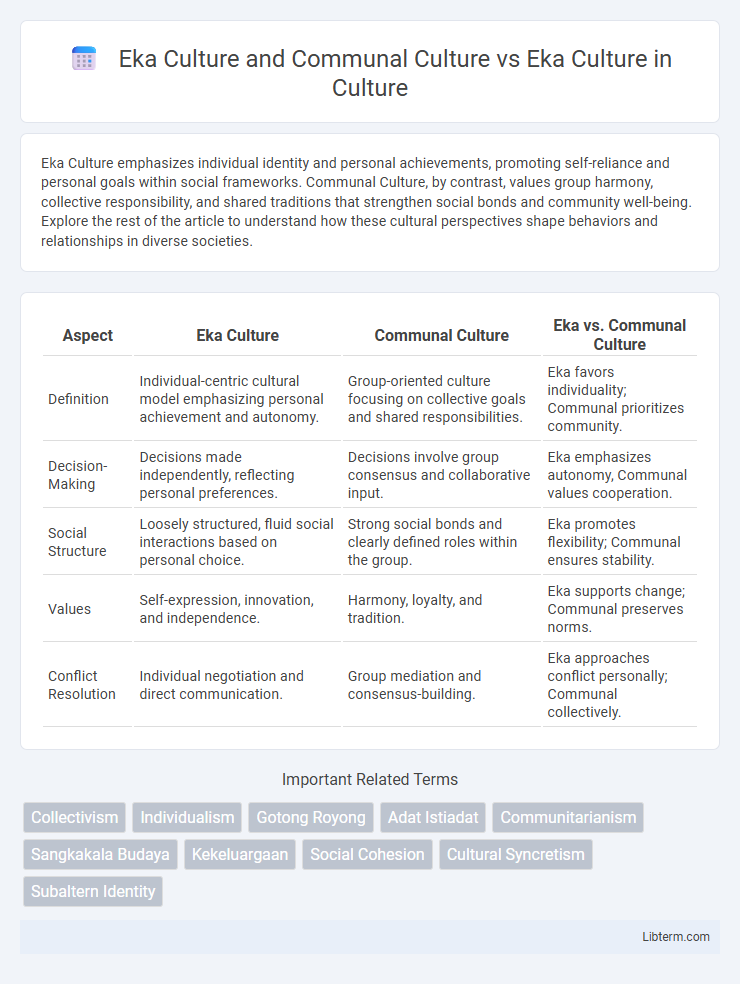Eka Culture emphasizes individual identity and personal achievements, promoting self-reliance and personal goals within social frameworks. Communal Culture, by contrast, values group harmony, collective responsibility, and shared traditions that strengthen social bonds and community well-being. Explore the rest of the article to understand how these cultural perspectives shape behaviors and relationships in diverse societies.
Table of Comparison
| Aspect | Eka Culture | Communal Culture | Eka vs. Communal Culture |
|---|---|---|---|
| Definition | Individual-centric cultural model emphasizing personal achievement and autonomy. | Group-oriented culture focusing on collective goals and shared responsibilities. | Eka favors individuality; Communal prioritizes community. |
| Decision-Making | Decisions made independently, reflecting personal preferences. | Decisions involve group consensus and collaborative input. | Eka emphasizes autonomy, Communal values cooperation. |
| Social Structure | Loosely structured, fluid social interactions based on personal choice. | Strong social bonds and clearly defined roles within the group. | Eka promotes flexibility; Communal ensures stability. |
| Values | Self-expression, innovation, and independence. | Harmony, loyalty, and tradition. | Eka supports change; Communal preserves norms. |
| Conflict Resolution | Individual negotiation and direct communication. | Group mediation and consensus-building. | Eka approaches conflict personally; Communal collectively. |
Understanding Eka Culture: Definition and Origins
Eka Culture refers to a social system characterized by individuality, self-reliance, and personal achievement, rooted in Western philosophical traditions and modern economic frameworks. It emphasizes personal identity, autonomy, and merit-based success, contrasting with Communal Culture, which prioritizes group harmony, collective responsibilities, and interdependence. Understanding the origins of Eka Culture involves exploring Enlightenment values, industrialization, and the rise of capitalist societies that shaped individual-centric worldviews.
Key Characteristics of Eka Culture
Eka Culture is characterized by strict adherence to hierarchical social structures, with emphasis on individual responsibility and personal achievement within the community. It prioritizes communal harmony through shared customs, rituals, and collective decision-making, distinguishing it from more individualistic societal models. Key traits include strong kinship ties, mutual support networks, and integration of tradition into daily life, fostering a cohesive and resilient social fabric.
What Is Communal Culture? Core Principles
Communal culture emphasizes shared values, collective well-being, and mutual support within a community, fostering cooperation and social harmony. Its core principles include interdependence, collective responsibility, and the prioritization of group goals over individual ambitions. In contrast, Eka culture tends to focus on individual achievement and personal autonomy, highlighting self-reliance and individual rights.
Historical Development: Eka vs Communal Cultures
Eka culture emphasizes individual responsibility and self-reliance, historically rooted in societies where personal initiative drove survival and social progress. Communal culture, by contrast, developed with collective collaboration and resource sharing as essential responses to environmental and social challenges, fostering group cohesion and mutual support. The historical evolution of Eka culture reflects shifts toward personal autonomy, while communal culture traces back to early human communities prioritizing group interdependence.
Social Structures in Eka and Communal Cultures
Eka culture is characterized by hierarchical social structures where individual roles and responsibilities are clearly defined, often centered around a singular authority or leader. In contrast, communal culture emphasizes collective decision-making and egalitarian social organization, promoting shared responsibilities and mutual support among members. Social cohesion in communal cultures is maintained through consensus and cooperation, whereas Eka culture prioritizes order and stability through structured social ranks.
Individualism vs Collectivism: Main Contrasts
Eka Culture emphasizes individualism, prioritizing personal goals, autonomy, and self-expression, whereas Communal Culture focuses on collectivism, valuing group harmony, shared responsibilities, and interdependence. In individualistic Eka Culture, decision-making is driven by personal preferences and individual achievements, contrasting with the collective-oriented choices made in Communal Culture that prioritize the welfare of the community. This fundamental difference shapes social norms, communication styles, and conflict resolution strategies, highlighting individual rights in Eka Culture and communal obligations in Communal Culture.
Advantages of Eka Culture in Modern Society
Eka Culture emphasizes individual expression, fostering innovation and personal responsibility, which drives creativity and adaptability in modern society. In contrast to Communal Culture, Eka Culture promotes self-reliance and diversity of thought, enabling societies to quickly respond to changing economic and social environments. The flexibility and empowerment inherent in Eka Culture lead to enhanced productivity and cultural dynamism essential for contemporary global competitiveness.
Benefits and Challenges of Communal Culture
Communal culture fosters strong social bonds and collective support, enhancing cooperation and resource sharing among members, which leads to improved social cohesion and well-being. However, it can also present challenges such as limited individual autonomy, potential for groupthink, and difficulties in accommodating diversity within the community. Balancing these benefits and challenges is essential for sustaining a thriving and inclusive communal culture.
Cultural Interactions and Conflicts: Case Studies
Eka Culture emphasizes homogeneity within a singular cultural group, which often intensifies conflicts when distinct communal cultures interact, highlighting challenges in social cohesion and identity preservation. Case studies reveal that cultural interactions between Eka Culture and diverse communal cultures frequently result in misunderstandings, competition for resources, and ideological clashes, underscoring the importance of intercultural dialogue and conflict resolution mechanisms. Analyzing these dynamics in regions with overlapping cultural territories demonstrates how entrenched cultural pride within Eka Culture can both hinder and motivate negotiations toward peaceful coexistence.
Finding Balance: Integrating Eka and Communal Values
Finding balance between Eka Culture and Communal Culture involves integrating individual autonomy with collective responsibility to foster harmonious social dynamics. Emphasizing Eka Culture promotes personal freedom and self-expression, while communal values prioritize group cohesion, shared goals, and mutual support. Effective integration requires recognizing the benefits of both approaches to create adaptable communities that honor individuality without sacrificing social unity.
Eka Culture and Communal Culture Infographic

 libterm.com
libterm.com